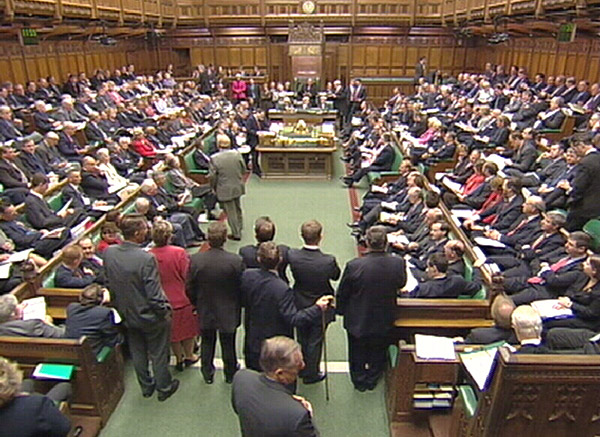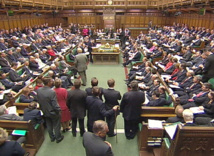"Whilst the military effort in Iraq is bearing fruit, that is much less certain in Syria," said the report.
The mission over Syria is being complicated by the desire to bring about the end of the Bashar al-Assad's regime and to replace it with a government that is "neither authoritarian and repressive, on the one hand, nor Islamist and extreme, on the other."
"These goals cannot be accomplished by military means alone," it concluded.
British MPs voted last year to join the US-led bombing campaign against IS jihadists in Syria, having already taken part in operations over Iraq.
Then prime minister David Cameron said Britain had a duty to "answer the call" from allies like France and the US, adding that bombing the "medieval monsters" of IS was "the right thing to do".
Cameron had wanted to extend Britain's role in the fight against IS for months but made a fresh push which led to the vote after the Paris attacks which killed 130 people.
However, 223 MPs, including Labour leader Jeremy Corbyn, voted against the strikes following hours of heated debate.
Despite the controversy, fanfare and the provision of two more Tornado and six Typhoon jets to join the six Tornados in service above Iraq, the report found that British planes had only undertaken 65 airstrikes in Syria since the vote.
"Furthermore, only a minority of the 65 UK air strikes in Syria appear to be in support of opposition forces on the ground," it added.
Cameron said airstrikes would support the 70,000 moderate opposition forces that he had identified.
The defence committee sought to test the 70,000 figure, but the government did not supply detailed information citing intelligence concerns.
The committee also warned that while the strategy to win back IS territory was necessary, it was not sufficient to counter the group's global threat.
"If DAESH (IS) transforms itself into an international movement or a network of affiliates—like al-Qaeda before it—which can survive the loss of territory, the UK Government approach will need to adapt," it said.
"For example, if DAESH is defeated in the Middle East but then grows strong in Africa, the current strategy will require major revision."
-------------------------------------------------------------------------------------------------
The mission over Syria is being complicated by the desire to bring about the end of the Bashar al-Assad's regime and to replace it with a government that is "neither authoritarian and repressive, on the one hand, nor Islamist and extreme, on the other."
"These goals cannot be accomplished by military means alone," it concluded.
British MPs voted last year to join the US-led bombing campaign against IS jihadists in Syria, having already taken part in operations over Iraq.
Then prime minister David Cameron said Britain had a duty to "answer the call" from allies like France and the US, adding that bombing the "medieval monsters" of IS was "the right thing to do".
Cameron had wanted to extend Britain's role in the fight against IS for months but made a fresh push which led to the vote after the Paris attacks which killed 130 people.
However, 223 MPs, including Labour leader Jeremy Corbyn, voted against the strikes following hours of heated debate.
Despite the controversy, fanfare and the provision of two more Tornado and six Typhoon jets to join the six Tornados in service above Iraq, the report found that British planes had only undertaken 65 airstrikes in Syria since the vote.
"Furthermore, only a minority of the 65 UK air strikes in Syria appear to be in support of opposition forces on the ground," it added.
Cameron said airstrikes would support the 70,000 moderate opposition forces that he had identified.
The defence committee sought to test the 70,000 figure, but the government did not supply detailed information citing intelligence concerns.
The committee also warned that while the strategy to win back IS territory was necessary, it was not sufficient to counter the group's global threat.
"If DAESH (IS) transforms itself into an international movement or a network of affiliates—like al-Qaeda before it—which can survive the loss of territory, the UK Government approach will need to adapt," it said.
"For example, if DAESH is defeated in the Middle East but then grows strong in Africa, the current strategy will require major revision."
-------------------------------------------------------------------------------------------------









 Home
Home Politics
Politics











